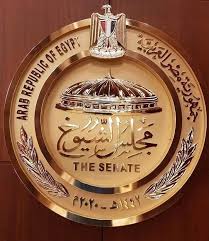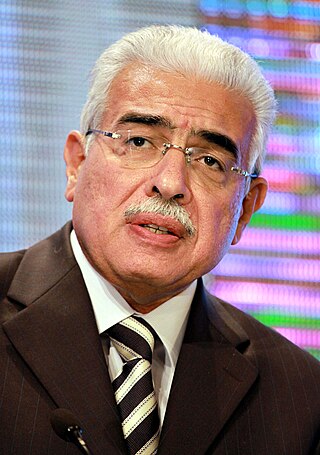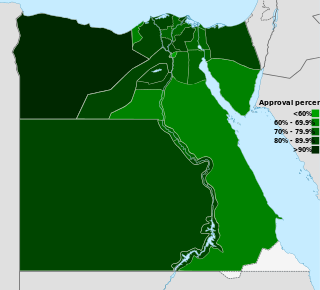A committee formed in February 2011 by the Egyptian military following suspension of the constitution during the 2011 Egyptian revolution. The committee's purpose is to review the constitution of Egypt, to be ratified by a referendum.
The eight-member committee tasked with amending the constitution is composed of legal experts of various ideologies, including secular liberal scholars, three judges from the current Supreme Constitutional Court, and a Christian. [1]
A constitutional amendment proposal announced on 26 February 2011 [5] proposed to amend Articles 76, 77, 88, 93, 139, 148 and 189 and to remove Article 179. [6] Changes to Article 76 would make it easier to become a presidential candidate. Either 30,000 signatures from at least 15 governorates (provinces), 30 members of a chamber of the legislature, or nomination by a party holding at least a seat in the legislature. [6] The proposed changes to Article 77 would limit the President to two terms of four years in office. [6] Changes to Articles 88 and 93 would restore judicial supervision of elections and allow the Constitutional Court of Egypt to control the validity of membership of parliament. [6] The proposed amendment to Article 139 would oblige the president to appoint a vice-president. [6] It was also proposed that a commission drafts a new constitution following the parliamentary election. [7]
The issue of limiting presidential powers was postponed until after the elections as part of the new constitution drafting process. [8]

The president of the Arab Republic of Egypt is the executive head of state of Egypt and the de facto appointee of the official head of government under the Egyptian Constitution of 2014. Under the various iterations of the Constitution of Egypt following the Egyptian Revolution of 1952, the president is also the supreme commander of the Armed Forces, and head of the executive branch of the Egyptian government. The current president is Field Marshal Abdel Fattah el-Sisi, who has been in office since 8 June 2014.

Kefaya is the unofficial moniker of the Egyptian Movement for Change, a grassroots coalition which prior to the 2011 revolution drew its support from across Egypt's political spectrum. It was a platform for protest against Hosni Mubarak's presidency and the possibility he might seek to transfer power directly to his son Gamal; political corruption and stagnation; "the blurring of the lines between power and wealth; and the regime's cruelty, coercion and disregard for human rights."

The Senate is the upper house of the bicameral Parliament of Egypt since its introduction in the 2019 Egyptian constitutional referendum and the subsequent 2020 Egyptian Senate election. The current president of the Senate is Abdel-Wahab Abdel-Razeq.
The Muslim Brotherhood is an Islamic organization that was founded in Ismailia, Egypt by Hassan al-Banna in March 1928 as an Islamist religious, political, and social movement. The group spread to other Muslim countries but has its largest, or one of its largest, organizations in Egypt, where for many years it has been the largest, best-organized, and most disciplined political opposition force, despite a succession of government crackdowns in 1948, 1954, 1965 after plots, or alleged plots, of assassination and overthrow were uncovered. Following the 2011 Revolution the group was legalized, and in April 2011 it launched a civic political party called the Freedom and Justice Party (Egypt) to contest elections, including the 2012 presidential election when its candidate Mohamed Morsi became Egypt's first democratically elected president. One year later, however, following massive demonstrations, Morsi was overthrown by the military and arrested. As of 2014, the organization has been declared a terrorist group by Russia, Egypt, UAE, Saudi Arabia and is once again suffering a severe crackdown.

The Constitution of the Arab Republic of Egypt was the former constitution of Egypt. It was adopted on 11 September 1971 through a public referendum. It was later amended in 1980, 2005, and 2007. It was proclaimed to update the democratic representative system in assertion of the rule of law, independence of the judiciary, and party plurality. On 13 February 2011, the Constitution was suspended following the resignation of President Hosni Mubarak as a result of the 2011 Egyptian Revolution. On 30 March 2011, it was "effectively voided" after a new provisional constitution was passed by the country's ruling Supreme Council of the Armed Forces. It has since been superseded by the Egyptian Constitution of 2012 and the current Egyptian Constitution of 2014.

The Constitution of Egypt has passed over a long period of evolution from the liberal constitution of 1923 to the contemporary constitution.

Presidential elections were held in Egypt in 2012, with the first round on 23 and 24 May 2012 and the second on 16 and 17 June, the first democratic presidential election in Egyptian history. The Muslim Brotherhood declared early 18 June 2012, that its candidate, Mohamed Morsi, won Egypt's presidential election, which would be the first victory of an Islamist as head of state in the Arab world. It was the second presidential election in Egypt's history with more than one candidate, following the 2005 election, and the first presidential election after the 2011 Egyptian revolution which ousted president Hosni Mubarak, during the Arab Spring. However, Morsi's presidency was brief and short-lived, and he later faced massive protests for and against his rule, only to be ousted in a military coup in July that year.

Parliamentary elections were held in Egypt in 2010. The first stage was held on 28 November 2010 and the second round was held on 5 December 2010.

Parliamentary elections were held in Egypt from 28 November 2011 to 11 January 2012, following the revolution that ousted President Hosni Mubarak, after which the Supreme Council of the Armed Forces (SCAF) dissolved Parliament. However the dissolution was ruled unconstitutional and Parliament was reinstated. Originally, the elections had been scheduled to be held in September 2011, but were postponed amid concerns that established parties would gain undue advantage.

A constitutional referendum was held in Egypt on 19 March 2011, following the 2011 Egyptian revolution. More than 14 million (77%) were in favour, while around 4 million (23%) opposed the changes; 41% of 45 million eligible voters turned out to vote.

The Egyptian Crisis is a period that started with the Egyptian revolution of 2011 and ended with the installation of a counterrevolutionary regime under the presidency of Abdel Fattah el-Sisi in 2014. It was a tumultuous three years of political and social unrest, characterized by mass protests, a series of popular elections, deadly clashes, and military reinforcement. The events have had a lasting effect on the country's current course, its political system and its society.

The following is a chronological summary of the major events that occurred during the Egyptian Revolution of 2011, after Hosni Mubarak's resignation. Protests and riots led to the deaths of hundreds, injuries of thousands and the arrests of tens of thousands. Millions have mobilised the streets since the revolution.

Mohamed Mohamed Morsi Eissa al-Ayyat was an Egyptian politician, engineer, and professor who served as the fifth president of Egypt, from 2012 to 2013, when General Abdel Fattah el-Sisi removed him from office in a coup d'état after protests in June. An Islamist affiliated with the Muslim Brotherhood organization, Morsi led the Freedom and Justice Party from 2011 to 2012.

The Egyptian Constituent Assembly of 2012 (CA) is the committee for the creation of a new Constitution of Egypt. The Muslim Brotherhood had announced that the Constituent Assembly would vote on the constitution on 29 November 2012. The Constituent Assembly will be able to avoid its possible dissolution by voting on the constitution earlier than the release of a ruling by the Supreme Constitutional Court on the assembly's legitimacy; the ruling was expected to occur on 2 December 2012. The court has postponed the verdict in response to protests. The Constituent Assembly approved the constitution on 29 November 2012; more than 16 hours were spent voting on its articles.
Following the 2011 Egyptian revolution, the Muslim Brotherhood in Egypt became one of the main forces contending for political power in Egypt against the Supreme Council of the Armed Forces (SCAF) and other established centers of the former Hosni Mubarak regime.

A constitutional referendum was held in Egypt in two rounds on 15 and 22 December 2012. Egyptians living abroad were scheduled to vote between 8 and 11 December. Voting for expatriates had been delayed until 12 December 2012 and was extended until 17 December 2012. Voters were asked whether they approve of the draft constitution that was approved by the Constituent Assembly on 30 November 2012.

The 2012–2013 Egyptian protests were part of the crisis in Egypt including the June 2013 protests, the July 2013 coup d'état, and part of the post-coup unrest. They saw varying opposition against three contiguous heads of state; namely, the Supreme Council of the Armed Forces (SCAF), Muslim Brotherhood, and the de facto ruling Egyptian Armed Forces.

A constitutional referendum was held in Egypt on 14 and 15 January 2014 and with Egyptians abroad voting between 8 and 12 January. The new constitution was approved by 98.1% of voters. Turnout was 38.6%.

The Constitution of the Arab Republic of Egypt is the fundamental law of Egypt.

A constitutional referendum was held in Egypt between 20 and 22 April 2019, The main proposed amendments were re-establishing the presidential term to six years, from four previously, and removing the limit of two terms on the president, thereby allowing President Abdel Fattah el-Sisi to potentially remain in power until 2030. The changes were approved by 88.83% of voters who voted, with a 44% turnout.